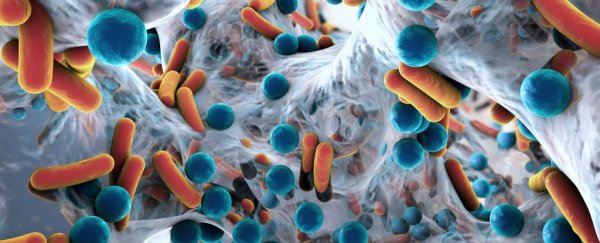Researchers have found that giving low doses of a common antibiotic to pregnant mice and their babies results in long term behavioural changes.
This is a pretty big deal, because if the results are replicated in humans it could mean that antibiotics taken during pregnancy could influence the child's development.
"Statistics from North America suggest that 70 percent of all children have received at least two courses of antibiotic before the age of two," one of the researchers, John Bienenstock, from McMaster University in Canada, told Katherine Lindemann at ResearchGate.
"These experimental results add to the list of concerns about the use and abuse of antibiotics in terms of long-term effects."
Although antibiotics are often necessary to keep us alive, there have been growing concerns about what they do to our microbiome - the harmless microbes such as bacteria that live on and in our bodies, and can often provide us with unexpected benefits.
On top of that, our overuse of antibiotics is causing many bacteria to become resistant to the drugs we have available, something that scientists are calling one of the biggest challenges of the 21st century.
Plus it's also quite difficult to not consume them – even if you don't want to.
"There are almost no babies in North America that haven't received a course of antibiotics in their first year of life," says Bienenstock.
"Antibiotics aren't only prescribed, but they're also found in meat and dairy products."
The researchers investigated 12 pregnant mice until after they gave birth – providing five with just water, four with water laced with the antibiotic penicillin, and three with penicillin-laced water and a probiotic called Lactobacillus rhamnosus.
When the mice gave birth, the researchers ended up with 72 pups and they found that those who were given the antibiotic had long-term changes in both their behaviour and their gut bacteria.
"We find that penicillin has lasting effects in both sexes on gut microbiota, increases cytokine expression in frontal cortex, modifies blood–brain barrier integrity and alters behaviour," the researchers wrote in the paper.
"The antibiotic-treated mice exhibit impaired anxiety-like and social behaviours, and display aggression."
But this isn't the end of the world, because the group given a probiotic as well had most of the effects of the antibiotic reduced.
Bienenstock told Lindermann that their research flags antibiotics "possible long-term negative effects, especially if given in early life, and identify the possibility that an appropriate probiotic taken twice a day may lessen such detrimental effects."
But we have to be careful here – this result has only been observed in mice studies. We'll need further proof in humans before we can say for certain that antibiotics are having an impact.
However, there has been lots of research linking antibiotic-use to change in gut bacteria, leading to an increased risk of a number of diseases.
"Epidemiological studies in humans are suggesting that antibiotic use, and especially long-term use, may be associated with a number of gut conditions including celiac disease, inflammatory bowel disease, colorectal cancer and obesity," Bienenstock added.
Just another reason to only use antibiotics when they're required. Your gut microbes will thank you for it.
The research has been published in Nature Communications.
